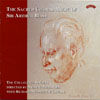Bliss - Sacred Choral Music
Here, the settings of Hopkins's [poem] poems stand out as Bliss allows one to 'take breath and read [them] with the ears'
View record and artist detailsRecord and Artist Details
Composer or Director: Arthur (Drummond) Bliss
Label: Priory
Magazine Review Date: 12/1999
Media Format: CD or Download
Media Runtime: 74
Mastering:
DDD
Catalogue Number: PRCD645

Tracks:
| Composition | Artist Credit |
|---|---|
| (The) Shield of Faith |
Arthur (Drummond) Bliss, Composer
(The) Collegiate Singers Andrew Angus, Baritone Andrew Millinger, Conductor Arthur (Drummond) Bliss, Composer Juliet Telford, Soprano Richard Moorhouse, Organ |
| O give thanks unto the Lord |
Arthur (Drummond) Bliss, Composer
(The) Collegiate Singers Andrew Millinger, Conductor Arthur (Drummond) Bliss, Composer Richard Moorhouse, Organ |
| Stand up and bless the Lord your God |
Arthur (Drummond) Bliss, Composer
(The) Collegiate Singers Andrew Angus, Bass Andrew Millinger, Conductor Arthur (Drummond) Bliss, Composer Caroline Paschalides, Soprano Richard Moorhouse, Organ |
| Seek ye the Lord |
Arthur (Drummond) Bliss, Composer
(The) Collegiate Singers Andrew Millinger, Conductor Arthur (Drummond) Bliss, Composer |
| Lord, who shall abide in thy tabernacle |
Arthur (Drummond) Bliss, Composer
(The) Collegiate Singers Andrew Millinger, Conductor Arthur (Drummond) Bliss, Composer Richard Moorhouse, Organ |
| (The) World is charged with the grandeur of God |
Arthur (Drummond) Bliss, Composer
(The) Collegiate Singers Andrew Millinger, Conductor Arthur (Drummond) Bliss, Composer New London Orchestra |
Author: John Steane
The longest works here, The Shield of Faith and The World is charged with the grandeur of God, come respectively first and last in the programme, as they do in a comparable disc by the Finzi Singers. In between are four shorter but still considerable pieces otherwise absent from the record catalogue. All of these were 'occasional' compositions, O give thanks unto the Lord (for instance) being written to celebrate the granting in 1965 of a Royal Charter to the island of Sark. Seek ye the Lord (for the Missions to Seamen) is the least festal, and perhaps the most memorable. All are considerately written for the likely forces available, and none, I would say, is merely a professional job well done. They are ably performed here, and the record would deserve a welcome even if it were on their account alone.
The others make comparisons necessary, and in these the sharper definition of the Finzi Singers and the Chandos recording gives them an advantage. The Collegiate Singers are a larger choir and these works call, certainly in live performance, for a body of at least comparable size; but in recording the smaller numbers help to gain the effect of precision. They also make the words clearer, though the acoustic and placing of the singers in relation to the instruments also play a part. In the Priory recording the choir sounds to me too recessed: the texts are so important in both of these works, they need more intimacy.
The Shield of Faith was Bliss's last major composition, written shortly before his death in 1975. It does not, so to speak, settle for an easy life. Pope's 'isthmus of a middle state' does not invite musical setting, and the big organ-toccata style of accompaniment fails at first - and probably at last - to commend itself. Tennyson's wrestling with his 'defects of doubt, and taints of blood' is more amenable, though the music may not wrestle hard enough. In the Hopkins settings (1969) the imagination seems more freshly stirred: certainly Bliss must have done as Hopkins wished readers to do with his poetry, to 'take breath and read it with the ears', though perhaps not observing quite so surely F. R. Leavis's additional prescription, 'with the brains and the body' too. And anyway, is not a choral setting of these essentially personal utterances an initial distortion which is hard to rectify? Well worth hearing, and rehearing, all the same.'
The others make comparisons necessary, and in these the sharper definition of the Finzi Singers and the Chandos recording gives them an advantage. The Collegiate Singers are a larger choir and these works call, certainly in live performance, for a body of at least comparable size; but in recording the smaller numbers help to gain the effect of precision. They also make the words clearer, though the acoustic and placing of the singers in relation to the instruments also play a part. In the Priory recording the choir sounds to me too recessed: the texts are so important in both of these works, they need more intimacy.
The Shield of Faith was Bliss's last major composition, written shortly before his death in 1975. It does not, so to speak, settle for an easy life. Pope's 'isthmus of a middle state' does not invite musical setting, and the big organ-toccata style of accompaniment fails at first - and probably at last - to commend itself. Tennyson's wrestling with his 'defects of doubt, and taints of blood' is more amenable, though the music may not wrestle hard enough. In the Hopkins settings (1969) the imagination seems more freshly stirred: certainly Bliss must have done as Hopkins wished readers to do with his poetry, to 'take breath and read it with the ears', though perhaps not observing quite so surely F. R. Leavis's additional prescription, 'with the brains and the body' too. And anyway, is not a choral setting of these essentially personal utterances an initial distortion which is hard to rectify? Well worth hearing, and rehearing, all the same.'
Discover the world's largest classical music catalogue with Presto Music.

Gramophone Digital Club
- Digital Edition
- Digital Archive
- Reviews Database
- Full website access
From £8.75 / month
Subscribe
Gramophone Full Club
- Print Edition
- Digital Edition
- Digital Archive
- Reviews Database
- Full website access
From £11.00 / month
Subscribe
If you are a library, university or other organisation that would be interested in an institutional subscription to Gramophone please click here for further information.




